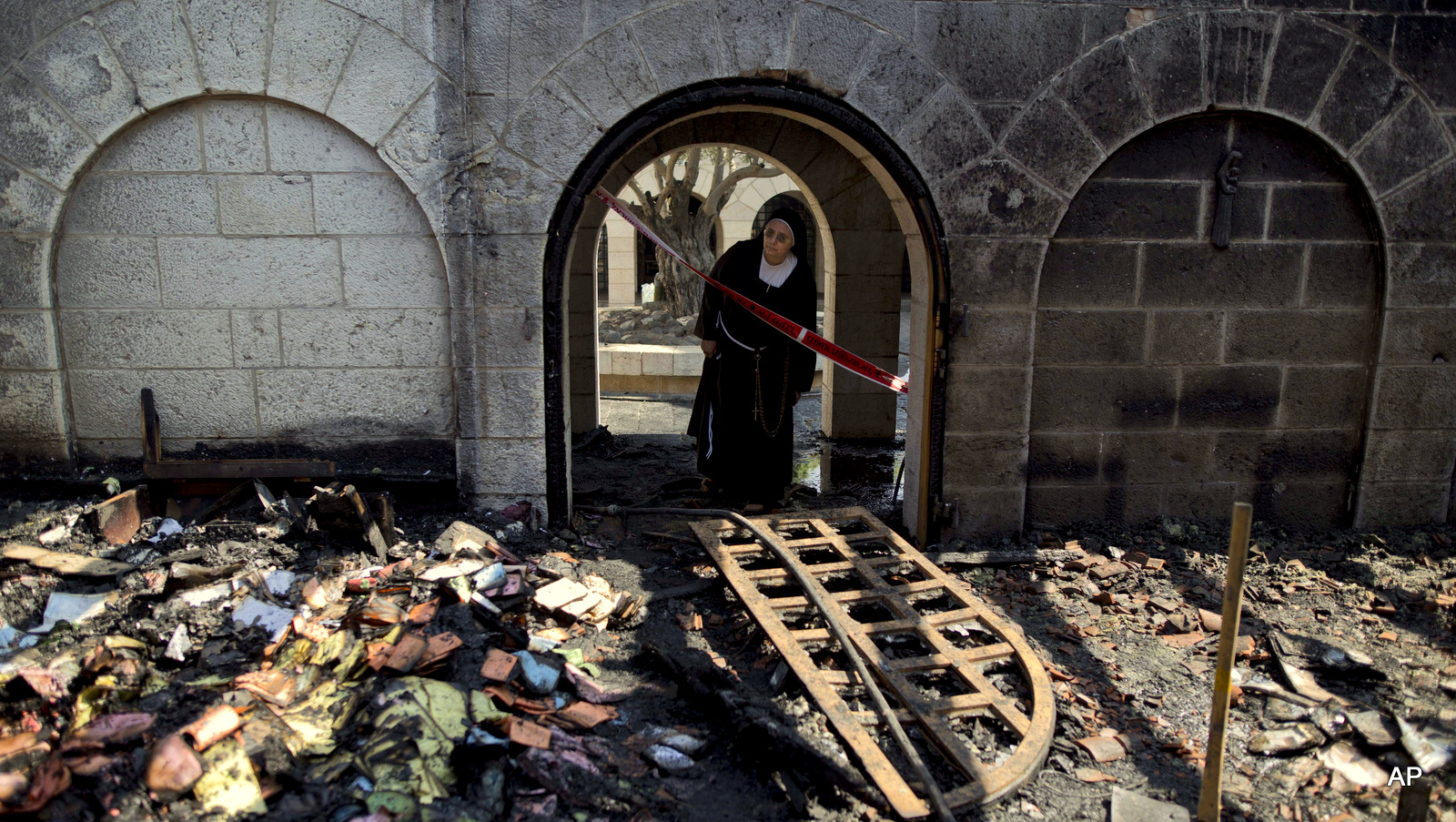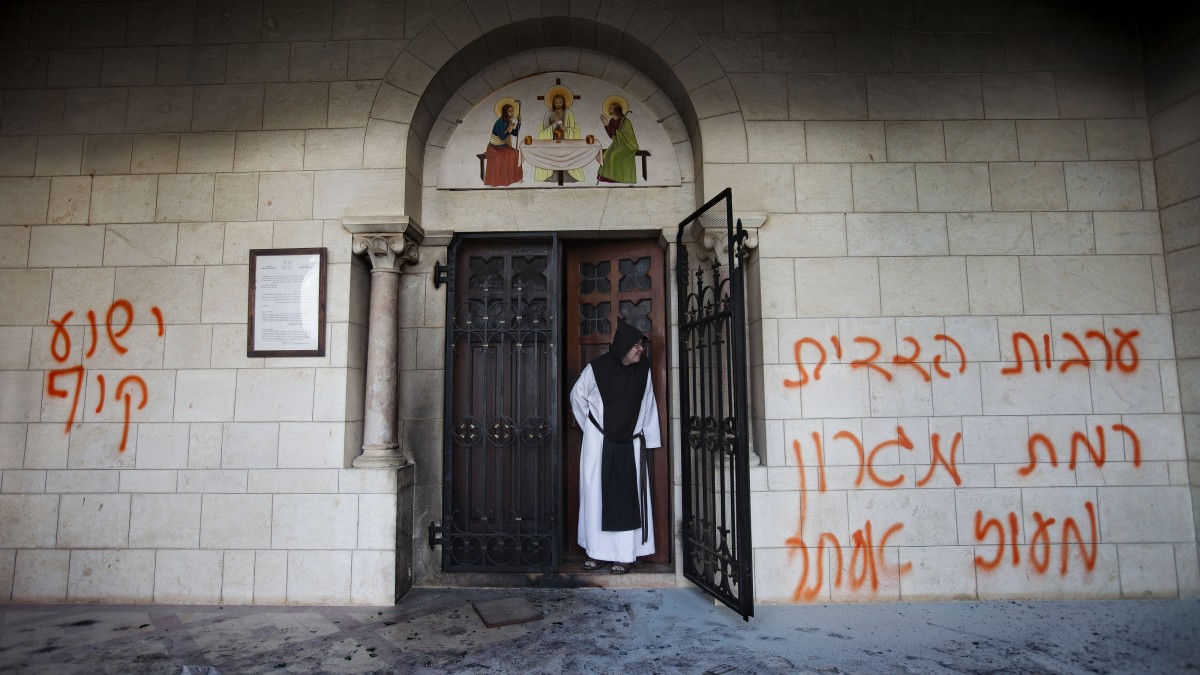
Last week, Jewish terrorists set fire to the Church of the Multiplication, a historic Catholic church located in the ancient village of Capernaum, where Jesus is believed to have divided the loaves and fish on the shores of the Sea of Galilee.
The fire destroyed substantial portions of the church complex, including the gift shop, an assembly room and an office for pilgrims. Bibles and prayer books were also destroyed in the conflagration, and the perpetrators scrawled graffiti, in Hebrew, on one wall quoting the Hebrew Alenu prayer, which derides non-Jews for their alleged worship of idols: “For their idols shall be destroyed.”
Israeli and international media have so far refused to label this as an act of terror or a religious hate crime. Instead, they’ve adopted the far less incendiary term, “arson.” Israel is generally loath to admit its Jewish citizens engage in terror. That is why the Shin Bet, Israel’s counterespionage and counterterrorism agency, rarely solves Jewish hate crimes. Indeed, few Jewish assailants in such attacks ever serve jail time.
Yet consider the reaction to a Palestinian-led attack which damaged or destroyed the Western Wall. Authorities would turn the entire Palestinian community upside down in an urgent effort to identify and arrest the culprit. Once that individual was found, he or she would spend the rest of their life in prison — that is, if he or she wasn’t gunned down before being taken into custody.
Indeed, Israel is ready, even eager, to categorize even the most minor acts of resistance as terrorism. It has even come to characterize the non-violent Boycott, Divestment and Sanctions movement as a form of political terrorism. When a Jew commits a violent act in the name of religion, it’s petty vandalism or hooliganism or the assailant is deemed mentally ill. When a Palestinian commits a violent act in the name of religion or nationalism, it’s terrorism.
Israel’s leaders respond to such attacks with public statements of remorse and vows to apprehend the perpetrators. While the rest of the world may be fooled by such demonstrations of faux contrition, Palestinians know that attacks against their most holy shrines will go unpunished. And that tells them all they need to know about their status in Israel.
Last year, young Jewish terrorists attacked the church’s outdoor prayer space along the lake, throwing rocks at worshippers, destroying a cross, and hurling benches into the water. No one was ever arrested or prosecuted in connection with these crimes. In fact, Haaretz reported: “Since 2011, 17 Muslim and Christian places of worship have been torched in Israel with nobody indicted in any of the cases.” The Israeli pro-democracy NGO Molad goes further, noting that despite a 200 percent rise in such religious hate crimes in 2014, in 42 previous incidents of vandalism going back to 2009 not a single individual has been prosecuted.
If Israel can’t prevent the destruction of religious institutions within its borders, should it expect the world to rally to the defense of synagogues when they’re attacked in Europe? Of course Jews have a right to expect such support and protection for their houses of worship, but isn’t it hypocritical for Israel to complain that European states don’t do enough for Jewish citizens when Israel exhibits a cavalier attitude toward its own churches and mosques?
Intolerance: The new normal?

Last year’s attack on the church on the shores of the Kinneret stands in sharp contrast to Jesus’s miracle on the same spot, in which legend has it that he turned a loaf of bread and two fish into enough food to feed 5,000 hungry souls. The former is religion as hooliganism; the latter, religion as mercy and compassion.
In response to last year’s attack, Israel Rabbi Nahum Weisfish brought a Jewish delegation to express solidarity and denounce the assault. He noted that one reason for the attack might be that the village once housed a great synagogue built in the 4th or 5th century, which stood on or near the site of the current Catholic church. There is a particularly intolerant form of militant Judaism running rampant in Israel today which would take offense at a Christian church flourishing while an ancient synagogue stands in ruins next door.
This calls to mind the 1994 attack by settler Baruch Goldstein on the Cave of the Patriarchs, in which he killed 29 Palestinian worshippers at the site held sacred by Islam and Judaism. And it isn’t at all dissimilar from the increasingly strident calls by such Jews for not just the rebuilding of the Holy Temple, but the razing of the Haram al-Sharif, the third most holy site in Islam. The Dome of the Rock stands on precisely the site where the ancient Jewish temple once stood. The campaign by settler extremists to invade the Noble Sanctuary in order to pray there is an attempt to prepare and purify sacred ground deemed defiled by the presence of a Muslim holy site which usurped it.
It’s no coincidence that crimes against Christian and Muslim holy sites are increasing in number and severity. Israel is an increasingly hateful society in which intolerance is the norm. There are even violent attacks carried out by Orthodox Jews against the Reform Women of the Wall, whose crime is to wish to wear prayer shawls and phylacteries as they read from the Torah in the main courtyard before the Western Wall.
The new Israeli government is filled with Orthodox Jewish ministers who’ve openly demonstrated a hatred of Muslims, Christians and gays. When low-level Jewish toughs see their prejudices reinforced by their leaders it emboldens them, it inspires them to ever greater attacks of physical violence.
Though the worst acts of Jewish terror have been confined to Palestinian and Muslim targets, it’s only a matter of time before perpetrators, seeking to expand their target-rich environment, turn to Christians. Next time there may be blood in the church pews.
The dangerous intersection of religion and politics
The environment of hate in Israel is reminiscent of a Hindu extremist assault on the ancient Babri Mosque in 1992, in which throngs of extremists tore apart the historic shrine stone by stone. Their ultimate goal was to rebuild an earlier ancient Hindu temple which had stood on the same site, Ayodhya.
It is no accident that Hindu nationalists such as these, including current Prime Minister Narendra Modi, find such common cause with Israel. Both governments view Muslims (in Israel’s case, the Palestinians; in India’s case, Pakistanis) with profound hostility. It was Modi who presided over the State of Gujarat, where over 2,000 Muslims were murdered in sectarian riots in 2002. Further, Modi recently promised to make the first visit by an Indian leader to Israel, and India is one of Israel’s largest customers for advanced military weapons systems.
Meanwhile, it’s worth noting that the attack on the Church of the Multiplication preceded by only a few hours the killing spree at a historic black church in Charleston, South Carolina. In this tragic incident, a young white supremacist, shouting slogans accusing blacks of raping white women, sprayed gunfire at a Bible study group, killing nine worshippers. In a comment reflecting what worshippers at the Church of the Multiplication must feel today, a member of Charleston’s black community referred derisively to the views of local whites: “We’re not worth the air they don’t want us to breathe.”
Similarly, in 1964, another white man filled with hate bombed a black Baptist church in Montgomery, Alabama, killing four little girls. The American South, like Jewish Israel, has a legacy of which employs religion to prove racial or ethnic superiority.
Yet there is a major difference between religion-based hate crimes in Israel and America. Here in the United States, race hate is a marginal enterprise. There are certainly networks of white supremacists who foment violence against blacks and Muslims, but they exist on the fringes of society. They do not resonate in the mainstream. And when they rear their ugly heads, federal law enforcement usually acts quickly and decisively against them. State and local enforcement may lag behind, but this is due as much to incompetence as to racism.
In Israel, religious violence is a stalking horse for the political mainstream. Israel has been captured by the ideology of Meir Kahane. He once existed on the margins just like American race-haters, but his legacy has been embraced by the political elites and now sits at the heart of Israeli society.
There is a common thread among these tragedies: They should alert us to the especially combustible combination of religion and politics. Political disputes which incorporate religion are much more lethal than those which have no religious basis. Nations with purely political disputes may resolve them through negotiation, but once the passions and certitudes of religion take over, there can be no bargaining. God doesn’t brook compromise.
When religious worship denies the validity of those who adhere to another religion, when it denies them humanity and respect, then religion becomes what these Jewish attackers claimed to detest: idol worship. But this is not religion based on spiritual or ethical values. It is religion as supremacy or triumphalism; religion at its worst.
A nation like Israel which allows such violent terrorists to run rampant is debased. It betrays the finest values of Judaism for a cheap high of nationalist adrenalin. We must not let such individuals appropriate religion for political gain.

